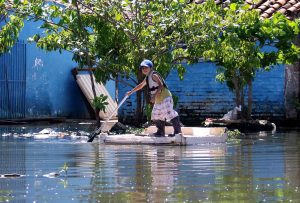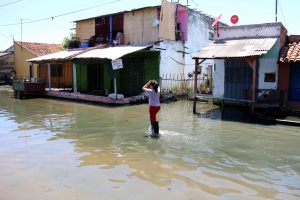
By Alejandro R. Otero
Asuncion, Dec 4 (EFE).- Many inhabitants of Asuncion’s river banks, known as the Bañado Sur district, have been forced to live in the unhealthiest of conditions caused by the stagnant water submerging its streets from the flooding Paraguay River, which has driven 7,500 families out of their homes after rising 5.94 meters (19 1/2 feet).
Despite the large number of people relocated that has remained “stable for a month,” according to the National Emergency Secretariat (SEN), some families have decided to stay in their homes, either because the water hasn’t entered their dwellings yet or for questions of security.
Those families remain in the area despite the unhealthiness of the stagnant water, the source of diseases and the breeding ground of mosquitoes that transmit the dengue, zika and chikungunya viral infections, local authorities warned.
Such is the case of Ismael Martinez, his wife Alexis Vera and their two children, who have been living for “three months” with the foul stench of stagnant water inundating their street in the Bañado Sur district of Asuncion, a situation made worse by the piles of waste accumulated there.
Vera said the situation “makes the kids vomit, have diarrhea and skin diseases.”
To avoid these dangers, authorities of the SEN and of the Asuncion municipality urge those living near flooded zones to move to what they call refuges, public areas like plazas and vacant lots where those left homeless are relocated into flimsy tents they have to put together themselves.
 The overcrowding in those areas doesn’t spare people from the unhealthiness, since aside from some portable restrooms, they haven’t enough sanitary resources or waste collections.
The overcrowding in those areas doesn’t spare people from the unhealthiness, since aside from some portable restrooms, they haven’t enough sanitary resources or waste collections.
The main sources of work in the neighborhood are the nearby shipyards, which make large-tonnage ships, but according to local residents, they stop working when “the water rises,” Ismael Martinez, 36, told EFE, adding that the rising river “stops the community from getting ahead.”
Added to those problems is the isolation they escape by moving around in boats, piloted by some local inhabitants like Agustin Gonzalez, 51, who said that in the flooded areas “there’s the danger of many reptiles, particularly vipers,” which means “people have to use boats to get to work.”
For his part, Martinez pointed to the need to “compensate people” who lose their homes and must “start all over again.”
